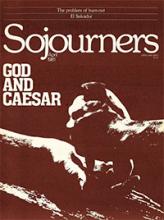Burn-out. The word has been around for a longtime. It has become such a jargon phrase that we easily forget the vivid imagery that called it forth. The word suggests a waning vitality, a fire going out. At worst, it denotes what is left over at the end: a cold vestige of something that once was aflame. Burned-out buildings are not an uncommon sight in our neighborhood. A charred, gutted, empty shell of what was once a building thriving with life is an ever-present reminder of burn-out's destructive reality.
Many recent articles and books have studied the phenomenon. All of them conclude that burn-out comes with the task of helping people. One writer humorously thinks that a mandatory caution should be written into every recruitment program for the helping professions: "Warning: Helping people can be extremely hazardous to your physical and mental health." Jesuit writer Alfred Kramer laments that "brevity" seems to be the one common characteristic of most forms of social ministry in direct contact with the poor and their problems. "Why is it," he asks, "that activists in Jesuit social ministry seem to have the longevity of a bomb squad?"
Burn-out cannot develop without dedication to high ideals. It has its roots in the unrealistic enthusiasm of determined idealists who have unlimited commitment to whatever they undertake. Burn-out-prone people are the caring ones among us who have a sense of mission and are especially vulnerable to the excessive demands that are made on them. They cannot compromise or admit defeat, but bring their habitual dedication to whatever thankless situation they encounter.
Read the Full Article

